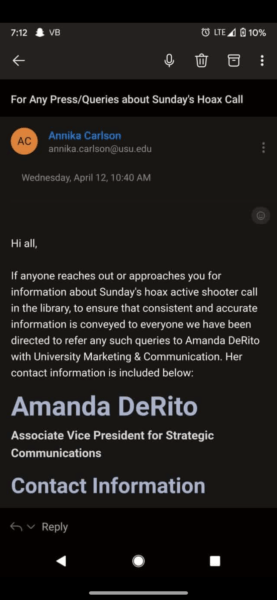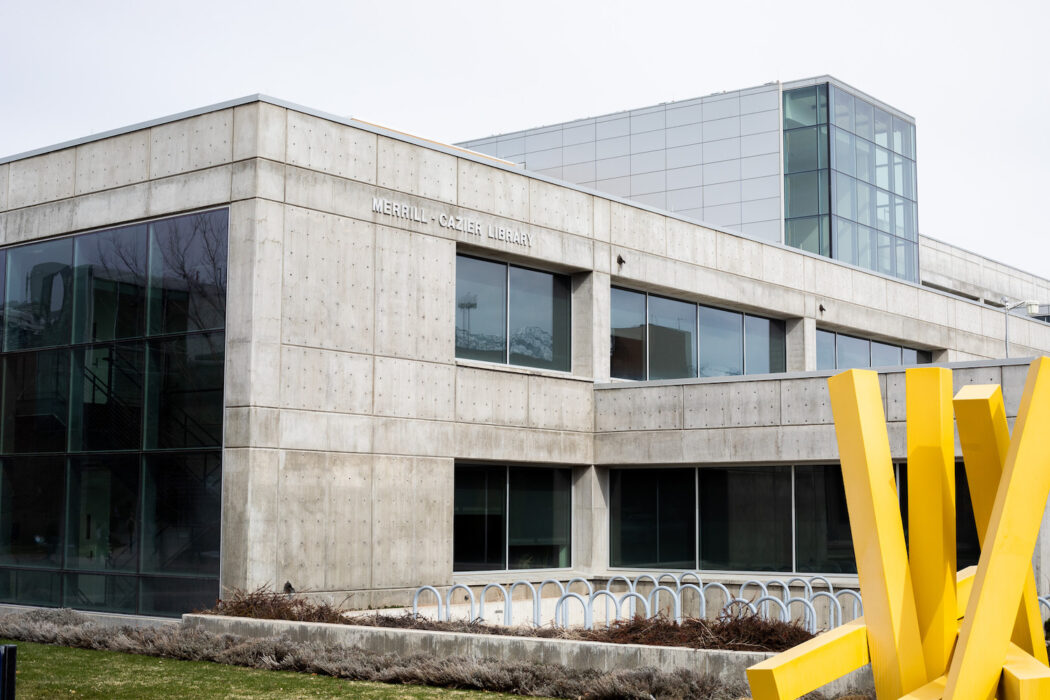Did USU police handle active shooter hoax call correctly? One employee says no
Cache County dispatch received a call on their non-emergency line around 10:15 p.m. on Sunday, April 9 from an out-of-state number claiming there was an active shooter at the Merrill-Cazier Library at Utah State University.
USU police say three officers responded to the call and quickly determined the call was a hoax upon arrival.
“They were there within just minutes,” Captain Kent Harris, USU interim police chief, said. “They made contact with some folks in the library and were able to immediately determine that really nothing suspicious was going on in the library. They did clear the library and made sure every floor was checked.”
A USU press release following the threat stated, “USU Police takes this hoax extremely seriously and is following up in collaboration with the FBI.”
One employee, who prefers to remain anonymous, was working at the library at the time of the hoax call and when the officers came in — and disagreed they took it seriously.
“This is something they have obviously been trained on and I just do not feel like the actions they took reflected that,” she said. “If they had been wrong, people would be dead.”
One of her concerns is the lack of communication from the USU police officers to USU students. She believes a code blue alert should’ve been sent out to tell students there could be a potential shooter.
“Their first thing should have been to send a code blue about it being a possible shooter,” she said. “If they thought it was a possibility, they should have sent that out, because then us as employees could have evacuated to the back.”
Michael Kuehn, executive director of USU Public Safety, said the alert wouldn’t have made a difference and would have been sent out after the fact because of how fast officers responded.
“We’re not shy about putting out an alert,” Kuehn said. “Our dispatcher was sitting there when the call came in, ready to go, she had the protocols up, but we found out it wasn’t a real thing.”
The day before the hoax call at USU, Southern Utah University received a similar call claiming there was an active shooter on their campus — which proved to be false.
The St. George Spectrum & Daily News reported SUU was locked down for several hours as officers from multiple jurisdictions searched the campus, and locked down and evacuated buildings.
The article stated the Cedar City Police Department sent out an “all clear alert” around 1 a.m. the next day.
Kuehn said each case is different and USU shouldn’t be compared to SUU’s scenario. He said he stands by the USU officers’ actions.
“They’re all different, these things are very fluid,” he said. “There’s no A, B, C, D, or E, we responded pretty darn fast. We take it seriously every time.”
The library employee said she also has concerns at how the three officers handled the situation when they got to the library.
She said she was asked if she had heard any gunshots from an officer when he first came in, and when she asked what was going on, the officers gave her little information, leaving her scared and confused.
“I feel like after their behavior, I feel like they’re not something I can count on in that situation,” she said.
The employee also said the officers chose not to lockdown the library, even when they first arrived.
Kuehn said they followed all of the proper protocols and said their objective was to eliminate unnecessary fear.
“When these people call, they want to instill panic, they want to instill terror,” Kuehn said. “If we can keep it to whatever level seems appropriate, I think that we’re doing the right thing.”
Another concern was that the university was attempting to hide the incident.
Three days after the shooting hoax, the library employee received an email from one of her bosses at the USU library that discouraged all employees who were there from talking to the press and instead, suggested referring them to Amanda DeRito, USU associate vice president for strategic communications.

“I understand that their protocol is to reach out to her to ask what they should say, but not with a situation like this,” the employee said. “I feel like I’ve been told to shut up because they see what was done wrong and don’t want us to discuss it.”
DeRito said the reason wasn’t to keep anything secret, but rather was to ensure consistent information was presented to everyone.
“We wanted to ensure those who needed more information were able to receive it, that we provided accurate facts to dispel rumors or misinformation that may arise later,” DeRito wrote in an email to the Statesman. “In general, university staff are asked to clear any media inquiries with their supervisor.”
However, the employee took her concerns to USUSA president Clara Alder and USU student advocate Ethan Conlee, who the employee claims didn’t know about the hoax until she informed them.
After learning about the news, Conlee said it concerned him, not necessarily how the officers responded, but after realizing most departments on campus don’t have active shooter protocols or training.
“It seems that the library at a minimum would have that,” Conlee said. “But, the more I’ve talked to other student employees, nobody has it.”
Although all university employees may not receive training directly from their department, Kuehn said the USU Department of Public Safety does offer ways to prepare yourself in that situation.
You can find tips for preparing for an active shooter or schedule a training for a USU department at www.usu.edu/dps/training/armed-aggressor-training.
To learn about what to do in response to an active shooter, visit www.usu.edu/dps/training/run-hide-fight.
Kuehn explained because the hoax call came from out of the state, it crosses state lines and therefore is being investigated on a federal level.
“If there’s anything we can do to help explain some of the things that were done, we’re happy to do that,” Kuehn said. “We encourage people to reach out to us — we realize it was a very scary incident.”
-Jacee.Caldwell@usu.edu
Featured photo by Heidi Bingham

